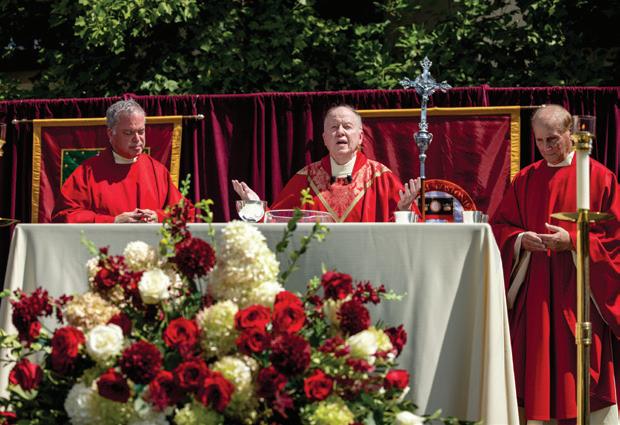
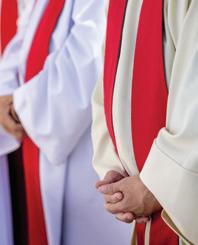

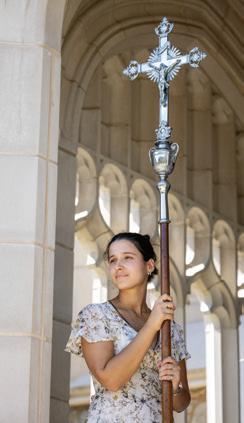





Aurelia Campbell and Cathy Della Lucia, faculty members in the Boston College Art, Art History, and Film Department, have been awarded major fellowships—a national recognition of the artistic talent and scholarship within the department. Campbell, an associate professor of art history and the department chair, is a
2 Around Campus Info on flu, COVID, RSV shots; BC makes LinkedIn list.
4 Molecular View Chemistry researchers examine tRNAs and diseases.
8 MCAS Dean’s Colloquium Panel on economic, foreign policy.
recipient of a 2025-2026 George A. and Eliza Gardner Howard Foundation Fellowship; Della Lucia, an assistant professor of studio art, received a 2025 Joan Mitchell Foundation Fellowship.
The George A. and Eliza Gardner Howard Foundation, an independent agency administered at Brown University, grants annual unrestricted fellowships to assist in the intellectual and artistic growth of early mid-career individuals. Campbell was awarded a fellowship in the category of Art History, Architecture, and Visual Culture.
Campbell specializes in the architecture and material culture from the Yuan, Ming, and Qing dynasties (1279-1911) in China. She is interested in issues concerning materials and technologies, sacred objects and spaces, and the relationship between the imperial court and outlying regions.
During her fellowship, she will work on her forthcoming book, In Death as in Life: A Material History of Ming Dynasty Tombs
BY SEAN SMITH CHRONICLE EDITOR
An eldercare employee benefit that is the subject of a Boston College School of Social Work case study holds promise for the millions of working Americans who face the challenge of caring for aging family members and loved ones, according to the BCSSW researchers.
Supported by a grant from AARP, Associate Professor Christina Matz—director of the Center on Aging & Work at BCSSW—and doctoral student Chin-Yi Su have authored an innovative-practice case study of the Concentric Caregiving Program, which provides flexible paid leave each year to employees at global digital agency Critical Mass, an employer partner in AARP’s Living, Learning & Earning Longer Collaborative.
Through Concentric, Critical Mass employees receive up to 40 hours—the equiv-
alent of five standard workdays—annually for eldercare responsibilities, which can be used in full days or smaller increments. Employees submit a request through an online form, with minimal explanation required, and Concentric hours are recorded in the company’s time-tracking software, enabling Critical Mass to monitor usage patterns and better understand caregiving needs. Concentric—developed by David Greene, a user-experience director and caregiving advocate at Critical Mass—also includes educational seminars on caregiving-related topics.
According to Matz and Su’s case study, approximately 10 percent of Critical Mass’s nearly 1,900 employees opted into the program when Concentric was introduced in 2023 (an update on current numbers has not yet been completed). In addition to flexibility and the ease of tracking it provides, Concentric has been praised
Continued on page 8
BY PHIL GLOUDEMANS STAFF WRITER
Stella M. Flores, a national expert on the impact of federal, state, and institutional policy on the college access and success of low-income, underrepresented, and immigrant students across the K–20 pathway, has been named the John E. Cawthorne Millennium Chair Professor in the Lynch School of Education and Human Development.
Previously a professor of higher education and public policy at the University of Texas at Austin, where she held crossschool appointments in the departments of Education, Leadership and Policy, and Curriculum and Instruction, Flores also served as director of research and strategy at UT-Austin’s Education Research Center. Prior to UT-Austin, she was an associate professor of higher education at New York University and served as the associate dean at NYU’s Steinhardt School of Culture.
As Cawthorne Professor, she will teach in the department of Educational Leadership and Higher Education, said Stanton E.F. Wortham, the Charles F. Donovan, S.J., Dean of the Lynch School.
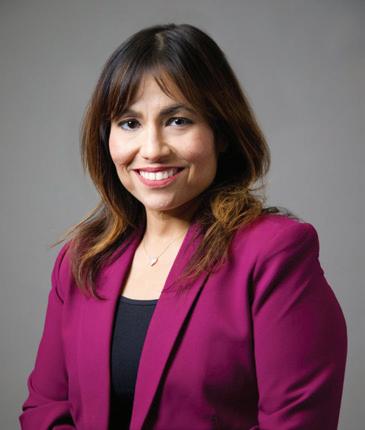
“We are thrilled to have Stella Flores join us as a member of the Lynch School faculty,” said Wortham. “Her work on education policy has been recognized for years as particularly influential. She will collaborate with our other strong scholars of education policy to create a hub for groundbreaking, visible work that will
Continued on page 4
Associate Vice President of the Murray Center for Student Wellness Dr. Douglas Comeau announced last week that Boston College will again offer seasonal flu shot clinics this fall, and will make available the RSV (respiratory syncytial virus) vaccination and the updated COVID-19 booster.
Those who wish to obtain both their flu vaccination and the booster at the same time may do so, Comeau added; the RSV vaccination will be offered to faculty and staff members only. COVID-19 boosters will be available after October 1 to those eligible.
Vaccination clinics began this week and will run from 8 a.m.-4 p.m. every Tuesday until December 9. Clinics will be held in the Connell Recreation Center’s wet classroom, located on the first floor adjacent
LinkedIn, the world’s largest professional social network, has ranked Boston College 22nd in its first-ever published list of the 50 best colleges for long-term career success in the United States. The ranking places BC among the nation’s most elite colleges and universities based on realworld outcomes between 2019 and 2024.
According to LinkedIn, the data-driven rankings were selected by evaluating 1,000 four-year colleges nationwide, measuring real career outcomes and job placement rates, internships, graduates who started their own companies, and how fast graduates “secure full-time roles, rise into leadership positions, [and] tap into the power of their alumni network.”
to the pool, and accessible from the lobby area. The pharmacy staff will confirm eligibility for vaccinations at the site.
Comeau noted that the clinic will be open for three days following the October long weekend: Tuesday, October 14, through Thursday, October 16, from 8 a.m.-4 p.m. He also said additional clinic hours may be based on demand.
The FDA/CDC eligibility criteria for vaccinations:
•Seasonal flu shot: Patients age six months and older
•Pfizer COVID-19 booster: Patients age 65 and older; patients age five and older with at least one underlying medical condition
•Moderna COVID-19 booster: Patients age 65 and older; patients age six months and older with at least one under-
lying medical condition
•RSV vaccine: Patients age 75 and older; patients age 50-74 who are at risk for developing severe illness
To make an appointment for flu shots, COVID-19 boosters, or RSV vaccine, use this link: www.starmarket.com/vaccinations/group-clinic?aid=d926aa7e-1d77f011-b4cc-000d3a3aeaab
After successfully registering, you will receive an email confirmation.
Those having difficulty making an appointment are advised to check back on the scheduler, as the pharmacist adds more availability a week in advance.
Persons seeking flu vaccinations should bring insurance cards (medical and prescription), as insurance is required for flu vaccines. Those covered by Medicare should bring their red, white, and blue
Medicare card in addition to any other insurance card. Persons needing documentation of their flu shot may ask the on-site pharmacist at the clinic during their appointment.
Insurance cards (medical and prescriptions) also must be presented for COVID-19 boosters.
Comeau advised members of the University community to help minimize the chance of contracting and spreading a virus, including seasonal influenza and COVID-19, by monitoring their symptoms, practicing appropriate hand hygiene, and seeking medical consultation if they do not feel well.
University Health Services may be contacted at 617-552-3225 or uhs@bc.edu.
—University Communications
universities preparing students for longterm success,” said Joseph Du Pont, associate vice president of career services and integrated learning. “Career preparation is a University priority, rooted in our Jesuit mission to help students discern not only what they are good at, but what brings them joy and how they can use their gifts in service to the world.”
Integrated learning, noted Du Pont, another key facet of career preparation, empowers students to connect their classroom studies with experiences that extend beyond the limits of their academics.

Ninety-six percent of the Boston College Class of 2024 was employed, involved in service or fellowship, or enrolled in graduate programs. The median average salary for employed BC graduates was $74,500. Among those who were employed, nearly half utilized the University’s networking resources.
Administrators said that the LinkedIn ranking reflects the impact and effectiveness of the University’s career preparation and its dedication to assisting students in their search for vocational discernment— an outcome achieved not through the efforts of one office or department but in a collaborative endeavor.
“Boston College is honored to be recognized by LinkedIn as among the top
ASSOCIATE VICE PRESIDENT FOR UNIVERSITY COMMUNICATIONS
Jack Dunn
SENIOR DIRECTOR FOR UNIVERSITY COMMUNICATIONS
Patricia Delaney
EDITOR Sean Smith
“The core liberal arts skills students develop at Boston College—regardless of their field of study—provide a shared framework for understanding what employers seek and for cultivating the adaptability, communication, and problemsolving skills that anchor lifelong career success,” he said.
LinkedIn identified financial services as one of the top employment industries for BC graduates, reflecting the undergraduate finance program’s consistent ranking as one of the nation’s best, placing seventh in the most recent U.S. News and World Report ranking. Other top industries included technology and Internet, and hospitals and health care.
According to the “Top Colleges” report, most graduates landed positions in Boston, New York City, and Washington, D.C., and demonstrated proficiency in tangible
CONTRIBUTING STAFF Phil Gloudemans Ed Hayward Audrey Loyack Rosanne Pellegrini Kathleen Sullivan
PHOTOGRAPHERS
Caitlin Cunningham Lee Pellegrini
skills such as Stata, a statistical software for data science; OCaml, an industrial-strength programming language; and applied psychology knowledge.
Integrating academic excellence with real-world experience, BC’s graduates are equipped to lead, innovate, and serve in an evolving global landscape. Du Pont added,
“Together, these collective commitments ensure our graduates are prepared not just for their first job but for meaningful careers and lives of impact.”
For the complete list of “Top Colleges,” see linkedin.com/pulse/linkedin-top-colleges2025-50-best-long-term-career-success-kritf —Audrey Loyack
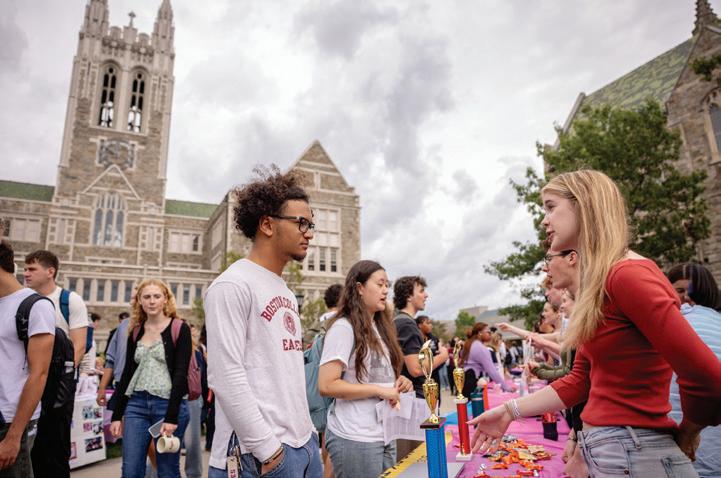
Boston
ests
and organizations—representing
photo by caitlin cunningham
The Boston College Chronicle (USPS 009491), the internal newspaper for faculty and staff, is published biweekly from September to May by Boston College, with editorial offices at the Office of University Communications, 3 Lake Street, Brighton, MA 02135 (617)552-3350.
Distributed free to faculty and staff offices and other locations on campus.
Periodicals postage paid at Boston, MA and additional mailing offices.
POSTMASTER: send address changes to The Boston College Chronicle, Office of University Communications, 3 Lake Street, Brighton, MA 02135.
A flipbook edition of Chronicle is available via e-mail.
Send requests to chronicle@bc.edu.
BY PHIL GLOUDEMANS STAFF WRITER
In 2005, an American ballroom dance competition titled “Dancing with the Stars” premiered on ABC-TV, launching a highly successful 20-years-and-counting run for the hit TV series—often referred to as “DWTS”—that features celebrities paired with professional dancers.
In the same year, a community-based non-profit dance education program with the same initials, founded by a Boston College alumna and trustee, kicked off in a Philadelphia school. But the stars of this “DWTS” are students in grades three through 12 seeking fun, confidence, selfesteem—not the TV show’s Mirrorball Trophy.
Now, a Boston College study has found that the 20-year Dancing with the Students program’s benefits go far beyond youth learning to ballroom dance.
This past April, researchers from the Lynch School of Education and Human Development presented their findings from an investigation into DWTS at the American Educational Research Association’s annual meeting, the world’s largest gathering of education researchers and a showcase for groundbreaking, innovative studies.
Titled “Supporting Students’ Holistic Development through Dance Education: The Role of Non-profit Community-based Programs,” the study’s results demonstrated that DWTS effectively supported wholeperson learning in both immediate ways and throughout participants’ lives, according to principal investigator Deoksoon Kim, a Lynch School professor in the Teaching, Curriculum, and Society Department.
Focusing on the Ming dynasty, the book examines new approaches to tomb space, grave goods, and the treatment of the body in light of contemporaneous social and economic developments.
“I’m thrilled to be selected as a Howard Foundation Fellow alongside such an impressive group of art historians and visual artists,” said Campbell. “The fellowship will be instrumental in allowing me to complete my second book, especially in terms of conducting necessary field work in China on the material culture of Ming tombs.”
Campbell’s first book, What the Emperor Built: Architecture and Empire in the Early Ming, examined the building projects of the famous Yongle emperor to consider how imperial ideology takes shape in built space. It was awarded the Bei Shan Tang Monograph Prize from the Association for Asian Studies and an honorable mention for the Alice Davis Hitchcock Book Award from the Society of Architectural Historians.
Campbell has engaged in several projects that help to advance the field of
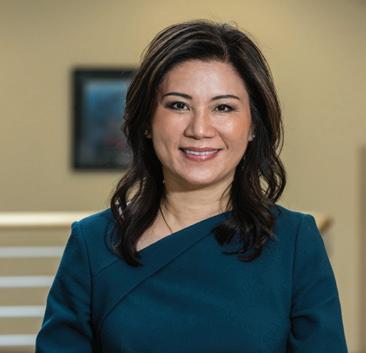
touching the lives of more than 7,000 young people across three states.
Students are taught four dance styles— waltz, swing, tango, and merengue—during the first nine weeks. In week 10, the dance couples compete for medals and trophies at the “Grand Finale,” which, according to Shea, has become a treasured tradition for their families and their community. Additionally, some participants continue with the program beyond the 10 weeks in afterschool programs.
alumni and instructors included the dimensions of whole-person learning targeted through the DWTS program, and how the DWTS program supports whole-person learning.
A DWTS instructor underscored that artistic development and creativity are paramount to the program: “We constantly encourage students to bring their own personal flair to each style of dance.”
“Our findings supported prior research that indicates that the arts provide an avenue for self-expression and foster creativity and empathy, while developing respect for others, inner strength and drive, and also assist in identifying personal goals,” said Kim, noting that interviews were conducted with DWTS staff and graduates.
“The DWTS program also inspired a sense of purpose among its alumni, with many developing a strong appreciation for giving back to the community.”
Dancing with the Students was founded by University Trustee Susan Martinelli Shea ’76, a former special education teacher who earned a master’s degree in communicative disorders from Johns Hopkins University. DWTS now offers ballroom dance lessons to students in more than 30 schools in Philadelphia, Los Angeles, and Lexington, Ky., without financial support for the arts,
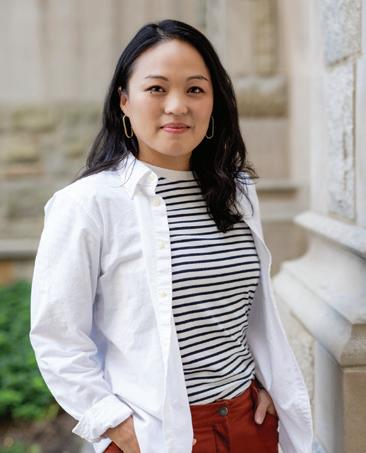
Chinese architectural history, including compiling three annotated bibliographies for Oxford Bibliographies on the subjects of palace architecture in premodern China, Buddhist architecture in Imperial China, and architecture of the Ming and Qing dynasties. She has also been involved in an international collaboration to create an English dictionary of traditional Chinese architectural terminology. Since 2022, she
In 2015, Philadelphia-area students in the program performed at the Festival of Francis for Pope Francis during his visit to the United States. They’ve also demonstrated their art at Philadelphia 76ers basketball games, Philadelphia Charity Balls, and a sold-out Philadelphia Phillies game.
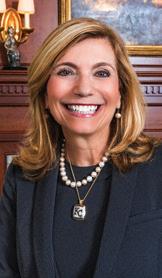
According to Shea, DWTS is about much more than just learning the steps to the waltz.
One DWTS alum said the program helped him “grow some tough skin,” and defend his beliefs.
“Our goal has always been to develop a community that empowers children through traditional ballroom dance as an inspiration for hope, confidence, and fun,” says DWTS founder Susan Martinelli Shea ’76.
“One of my siblings… really didn’t care for the program so he’d make jokes about it,” said Ernie. “So that’s when I started to identify my identity and just be true to who I am and actually stand up for things that I like to do, which [is] dancing.”
“I started this non-profit to bring dance, artistic empowerment, and fun to schools with little funding for the arts,” she said. “Our goal has always been to develop a community that empowers children through traditional ballroom dance as an inspiration for hope, confidence, and fun. To see this program blossom into an opportunity for true formative education has exceeded my wildest dreams.”
Key research questions for program
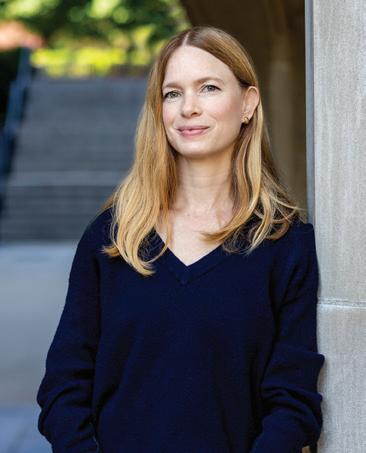
has served as the visual arts editor for the journal Religion and the Arts.
The Joan Mitchell Foundation cultivates the study and appreciation of the titular artist’s life and work, while fulfilling her wish to provide resources and opportunities for visual artists. The foundation awarded 2025 fellowships to 15 artists from across the United States working in the fields of painting and sculpture. Della Lucia and
Another graduate focused on the program’s intrapersonal development, noting the “confidence that it instills in you, especially as a young Black or Brown person, where there can be a lot of spaces where you don’t feel like you belong.”
Rae told the researchers that the program helped her push herself to her full potential.
“I’m a star!” she declared. “I’m able to do something. I’m just as important as anyone [else].”
More information about Dancing with the Students is available at www.dancingwiththestudents.org
other winning artists receive direct funding, distributed over five years, alongside professional development, peer engagement, and network-building programs.
“I’m honored to be named a Joan Mitchell Fellow alongside such an incredible group of artists,” said Della Lucia. “This fellowship provides invaluable support to sustain my studio practice and will allow me to jump in on a new body of work that is informed by recalled toys from the U.S. and Korea. I’m especially excited to expand my network and exchange ideas as part of a wider conversation in sculpture and painting with my cohort.”
Della Lucia, who teaches sculpture and 3D design at BC, creates multi-part sculptures from wood, ceramic, and digitally fabricated materials that are designed to come apart. Her work explores modularity and the relationship between the body and objects such as tools, toys, and weapons. Her work has been featured in Sculpture Magazine and Boston Art Review, and her recent exhibitions include the 808 Gallery at Boston University, Mazmanian Gallery at Framingham State University, Overlap Gallery (Newport, RI), Radial Gallery at the University of Dayton (Ohio), Kniznick Gallery at Brandeis University, and Abigail Ogilvy Gallery (Boston/Los Angeles).
—University Communications
Boston College researchers use an engineered enzyme to reveal critical changes on tRNAs that occur during diseases
BY ED HAYWARD STAFF WRITER
An engineered enzyme is at the center of a new method to visualize molecular details in human cells, and how these molecules change in cancerous versus benign cells, Boston College researchers recently reported in the journal Cell Chemical Biology. The method—dubbed “MapID-tRNAseq”—allowed researchers to examine transfer RNAs, or tRNAs, and their changes within human cells at once, according to the report. tRNAs ferry protein building blocks inside of cells, making them biologically essential. Dysregulated tRNAs are frequently involved in human diseases.
“Our new method helped reveal critical changes on tRNAs that occur during diseases, specifically, cancerous versus benign breast tumor cells,” said Assistant Professor of Chemistry Huiqing (Jane) Zhou, who led the study, titled “MapID-based Quantitative Mapping of Chemical Modifications and Expression of Human Transfer RNA.”
Zhou described tRNAs as very “bumpy” molecules for a cell to process. While most RNAs are composed of four nucleotides, tRNAs carry abundant chemical decorations on the nucleotides, which effectively block natural processing enzymes on tRNAs during these biological transactions.
“These events have largely impeded existing techniques to detect tRNAs,” said Zhou. “We developed a method to effectively process human tRNAs by applying
Continued from page 1
shape the field.”
Her current research examines compelling issues throughout the spectrum of education, often referred to as “K-20” (from kindergarten through the college/ university level): the long-term outcomes of state financial aid programs, the role of immigration and citizenship status in shaping educational attainment, and the potential for artificial intelligence tools to support research and policy analysis in education and workforce systems. She has published widely on demographic changes in American schools, affirmative action in higher education, financial aid policies, college completion, and minority-serving institutions.
Flores is the second holder of the John E. Cawthorne Chair, named for the longtime Lynch School associate dean and scholar of urban education, who died in August 2014. She succeeds Marilyn Cochran-Smith, who had served as Cawthorne Professor from 2004 until her retirement in 2023.
“Boston has always felt like a second home since my time here as a graduate student, so it is a privilege to return as a facul-
an engineered enzyme, which is a reverse transcriptase [an enzyme used to convert RNA to DNA] from our earlier work. This enzyme is critical in enabling highthroughput and accurate detection of cellular tRNA molecules.”
Zhou, joined in the project by graduate students Mitchel L. Tepe and Allison Carso, and undergraduate researcher Yitan Chen, studies human cells. Her lab extracts and purifies molecules of interest, such as tRNAs, from cultured human cells and uses a next-generation-sequencing (NGS)based approach to examine the molecular features of tRNAs.
Zhou and her team applied their method to four cell lines, including three mammary cell lines. Using MapID-tRNAseq, the researchers were able to map both tRNA modifications and expressions, discovering that some modification profiles from cell to cell largely remain unchanged.
However, a few modification sites showed cell type specifics.
Zhou found that tRNA expressions are largely dysregulated, or altered, in cancerous mammary cell lines compared to the benign cells. The researchers compared one benign cell line to two cancerous tumor cell lines. The cancerous tumor cells showed significantly less mitochondrialderived tRNAs compared to the benign tumor.
The team further explored mitochondrial expressions in these mammary cell lines and found that the ribosomal RNAs appeared to be less in cancerous tumor cells
ty member,” said Flores. “I am honored to join a community whose intellectual excellence and deep care for students and society set the highest standard for higher education. I look forward to shaping the next generation of human-centered research and practice in this transformational era.”
Flores launched her academic career at Vanderbilt University’s Peabody College of Education and Human Development where she served as an associate professor of public policy and higher education and held a secondary appointment in the Sociology Department.
She also served as a congressional evaluator with the United States Government Accountability Office and as a program specialist with the U.S. Economic Development Administration.
Flores has held numerous positions at the American Educational Research Association (AERA), including serving as a board member, and since 2021, co-editor of the journal AERA Open. She also serves on the boards of the Mexican American Legal Defense Fund, Institute for Higher Education Policy, and Association for Hispanics in Higher Education, and as a doctoral student mentor for the National Academy of Education and the Spencer Foundation.
In 2019, Flores received the Harvard

“The role of mitochondria in cancer has been a focus of researchers,” says Huiqing Zhou. “This leads us to believe that the gene expressions in mitochondria in breast cancer cells are in a defective state.”
compared to the benign cell line, while messenger RNAs (or mRNAs) remain mostly unchanged. Other studies have shown that mitochondrial proteins are often downregulated.
“The role of mitochondria in cancer has been a focus of researchers. This leads us to believe that the gene expressions in mitochondria in breast cancer cells are in a defective state,” said Zhou.
“Our data suggests that this protein dysregulation stems from the lack of tRNA and rRNA, which are crucial for protein production,” said Zhou. “It is not from a
Graduate School of Education Alumni Council Award for Outstanding Contribution to Education, and she was named “One of the Top 25 Women in Higher Education and Beyond” by Diverse Issues Magazine in 2017. She has also been recognized as one of the top 200 scholars in Education Week’s RHSU Edu-Scholar
lack of mRNA, or the blueprint of the proteins in question.”
While mapping modifications in the cell lines, the team found new modification sites on tRNA that merit further study. One modification could directly impact protein translation during protein production, said Zhou. The team is at work trying to understand the function of the puzzling modification.
For more on the BC study, see cell. com/cell-chemical-biology/fulltext/S24519456(25)00125-4
Public Influence Rankings consecutively since 2015.
A native of Edinburg, Tex., Flores earned doctoral and master’s degrees in education from the Harvard Graduate School of Education, a master of public affairs degree from UT-Austin, and a bachelor’s degree from Rice University.
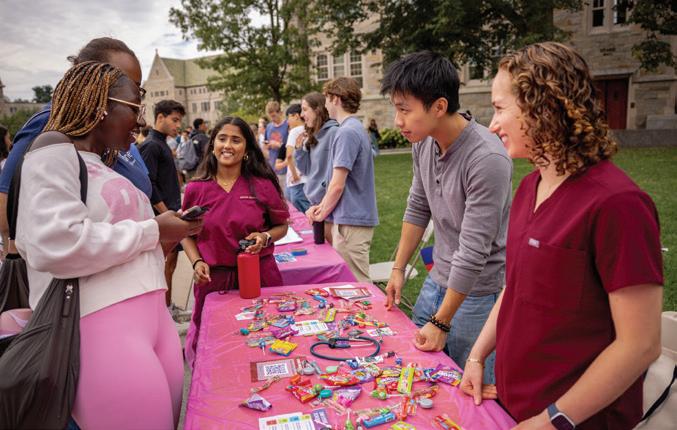
BY KATHLEEN SULLIVAN STAFF WRITER
Connell School of Nursing Assistant Professor Melissa Uveges recently received a research grant from the American Heart Association to support her project studying the screening of pediatric patients for the genetic condition Familial Hypercholesterolemia (FH), which causes high levels of low-density lipoprotein (LDL) cholesterol—also known as “bad cholesterol.”
Uveges’s grant, an Implementation Science Award for $396,500, represents the largest AHA research grant ever awarded to Boston College and the first-ever AHA funding for the Connell School.
According to statistics cited by Uveges, about 1 in 250 individuals has FH. This is significant given that high levels of LDL cholesterol can lead to heart disease, the number one killer worldwide, according to the AHA.
Identifying FH early can result in a longer, healthier life, said Uveges. In the United States, screening recommendations for FH are conflicting. While the U.S. Preventive Services Task Force reports insufficient evidence to recommend routine screening for FH in children, other organizations— including the AHA—endorse screening for FH in all children ages nine-11.
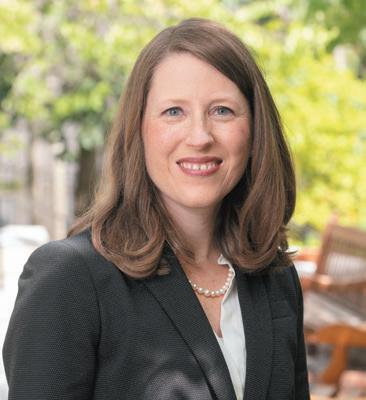
Uveges said that her research collaborator Dr. Sarah de Ferranti, associate professor in pediatrics at Harvard Medical School and chief of the Division of Ambulatory Cardiology at Boston Children’s Hospital, was co-principal investigator on a study “which found that screening for FH in children is better than screening for FH in adults because early screening allows for early initiation of medications to treat FH.
“Treating FH early results in less heart
BY PHIL GLOUDEMANS STAFF WRITER
Amy M. Alvarez, an associate professor of the practice at Messina College, was recently named the winner of the inaugural CARICON Prize for Poetry by the CARICON Foundation for her 2024 collection of poems, Makeshift Altar, an exploration of migration, ancestry, and resilience.
“Your book captured the attention and admiration of our selection committee for its literary excellence, cultural depth, and the powerful way it reflects the spirit of Caribbean storytelling,” said V. Steve Russell, executive director of CARICON, Inc., an international nonprofit dedicated to celebrating and promoting Caribbean writings, culture, and heritage. “Your work stands as a vital contribution to Caribbean literature.”
The CARICON Prize, launched this year as an annual international literary award honoring exceptional works by Caribbean authors across the Caribbean and the diaspora, celebrates new books in the categories of poetry, children’s literature, young adult novels, and fiction that exemplify powerful storytelling, cultural relevance, and literary innovation, spotlighting voices that explore the richness, complexity, and evolution of Caribbean identity and experience, according to CARICON.
“I wrote Makeshift Altar as an ode to my Caribbean roots and in celebration of island culture in diaspora,” said Alvarez, whose debut book was characterized as “stunning”
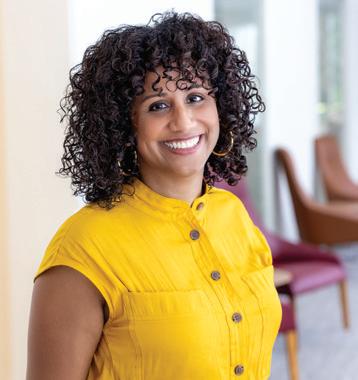
and “a fearless meditation on belonging and becoming” by the panel. “Therefore, winning the inaugural CARICON Poetry Prize is an incredible honor. It is a beautiful reminder that my work not only found its beloved audience, but that it was beloved in turn.”
Alvarez, born in New York City to Jamaican and Puerto Rican parents, will be honored at a formal presentation ceremony at the annual CARICON literary conference in June 2026 in Toronto. She teaches writing and literature courses at Messina College, and her scholarship focuses on race, ethnicity, gender identities, regionality, “borderless-ness,” systemic injustice, and social equity.
disease later in life.”
Despite these findings, said Uveges, “it remains unclear which screening approaches [i.e., preferred childhood age to screen for FH, whether to test for cholesterol or gene changes] and treatment approaches [i.e., which treatments, if any] would be preferred by families and providers if FH is diagnosed in a child.”
Uveges’s project, “An implementation strategy bundle to enhance adoption of pediatric Familial Hypercholesterolemia (FH) screening,” is about developing family-, provider-, and organizational-level strategies for improving the screening of pediatric patients (children ages 9-11) for FH.
“In this study, we will survey doctors and organization leaders, as well as interview children and parents, which will help us develop strategies that will increase the number of children screened for FH,” said Uveges. “In a future study, we will test these strategies to make sure they work. In the
First Year Academic Convocation
long run, we anticipate that this study will inform U.S. FH screening recommendations.
“I am fortunate that this work will be supported by the American Heart Association and am grateful for the opportunity to conduct this study, which is critical to pediatric and long-term public health,” she said.
Dr. de Ferranti and BC School of Social Work Assistant Professor Whitney Irie will serve as co-investigators on this project.
Uveges, who joined the Connell School faculty in 2020, is focused on improving the care of children with genetic conditions, as well as the health and care experience of their families. She has worked as a nurse in neonatal intensive care units and serves on Boston Children’s Hospital’s Ethics Committee. In addition to AHA, she is a member of the International Society of Nurses in Genetics, American Society of Bioethics and Humanities, and International Family Nursing Association.
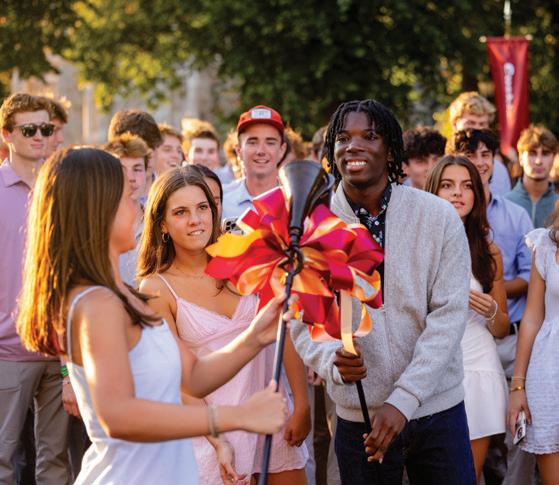

A few hours after Boston College celebrated the Mass of the Holy Spirit [see page 1], the Class of 2029 gathered on Linden Lane for the traditional First Flight Processional to Conte Forum, where they heard Gregory Boyle, S.J., speak at the First Year Academic Convocation.
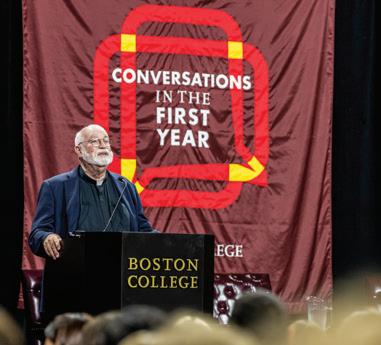
BY KATHLEEN SULLIVAN STAFF WRITER
The Clough School of Theology of Ministry will present its Alumni Distinguished Service Award to Jean Luc Enyegue, S.J., director of the Jesuit Historical Institute in Africa (JHIA), at the September 18 Daniel J. Harrington, S.J. Lecture—the first in a series of events being offered this fall by CSTM both in-person and via Zoom.
A native of Cameroon, Fr. Enyegue earned a S.T.L. from the Clough School in 2013. He leads the JHIA, an institute geared to preserving memory and promoting historical knowledge in connection with the Jesuit order’s involvement in the evangelization of Africa. His research is focused on the history of Christianity and Jesuit history in Africa. In addition to his role at JHIA, he is a lecturer at Hekima University in Kenya.
Fr. Enyegue will deliver the annual Harrington Lecture, “The Wisdom of Nya Modo and Afro-Globalization,” in the Corcoran Commons Heights Room beginning at 5:30 p.m. In the Ewondo language of Central Africa, a nya mdo refers to a wise person, often an elder, whose social influence fosters communal cohesion, ethical guidance, and a sense of hope. His talk will explore how nya modo can be used as a conceptual framework for interpreting

African Christianity and its role within the global Church. Fr. Enyegue argues that this concept provides a compelling model for the theological reflection, positioning African Christianity as a source of hope for African communities and the world at large.
On October 1, Archbishop of Las Vegas George Leo Thomas will present “Grace Abounds in Sin City: The Astounding
Growth of the Church in Las Vegas” in the Heights Room starting at 5:30 p.m. The archbishop will share elements of his pastoral blueprint—largely drawn from the vision and values of the Second Vatican Council—that has resulted in dynamic parishes, standing-room-only Masses, a highly engaged laity, and a deep sense of shared responsibility among clergy and lay leadership alike. Installed as the bishop of Las Vegas in 2018, he was named the first archbishop of Las Vegas when the diocese was elevated to an archdiocese in 2023.
Mar Muñoz-Visoso, executive director of the Secretariat for Cultural Diversity in the Church of the United States Conference of Catholic Bishops, will give two presentations, one in English on Oct. 23 in the auditorium of the Theology and Ministry Library beginning at 5:30 p.m., and one in Spanish on Oct. 25 in Simboli Hall starting at 9 a.m.
Muñoz-Visoso will explore how, to be the Church Jesus wants, communities of faith must continually strive to be a faithful reflection of the Triune God they profess to believe in: a communion of love and life so strong that nothing can break it. From prayer life to actions with one another and in the world, she contends, Catholics ought to consider issues of diversity in light of the Church’s mission and identity.
The annual Ministry Renewal Day will be celebrated on November 14 with a pre-
BY ED HAYWARD STAFF WRITER
This summer, Messina College announced that it will partner with Waltham-based Commonwealth Financial Network to provide internships as part of the approach to career readiness at Boston College’s two-year residential college.
The Commonwealth partnership will provide Messina students with the opportunity to work 10-12 hours a week gaining skills that relate to their majors of applied data science, applied psychology and human development, general business, and health sciences, said Messina College Dean Erick Berrelleza, S.J.
“Internships will help our students discern where they can make their impact in the world and what their vocation might be in the broadest sense of the word,” said Fr. Berrelleza. “We are thrilled that Commonwealth Financial Network will be providing these experiences to our talented students. We are equally excited that our students will share their diverse experiences with Commonwealth.”
At Messina, internships, or clinical rotations for students studying health sciences, will take place during the fall semester of students’ second year. Students will simultaneously take a three-credit seminar course to help them connect their internship experience to their academic and professional goals and reflect on and articulate the professional skills they are gaining.
“Internships are around the corner for our soon-to-be second-year students,” said Fr. Berrelleza when the program was announced. “Students have been interviewing with our internship partners this semester. It is great to see the commitment of these corporations and organizations to Messina College students. We’re excited to see the good things our students will do and all they will gain from these experiences.”
A national RIA dedicated to providing financial advisors with holistic, integrated business solutions, Commonwealth will welcome 10 students to its Waltham headquarters.
Messina College’s internship program is designed to provide the group of firstgeneration students with early career experiences that advance their education and prepare them for the next steps on their professional journeys. Commonwealth anticipates that some students will return as summer interns and may be offered fulltime employment upon the conclusion of their studies.
“As a longtime BC supporter, I couldn’t be more excited about the mission of Messina College,” said Wayne Bloom, CEO of Commonwealth. “This partnership isn’t just about opening doors—it’s about welcoming students who have outstanding talents to offer in our organization and the financial services industry.”
Bloom and his wife Veronica are cochairs of BC’s Parents Leadership Council, and three of the couple’s four children are
sentation by CSTM Assistant Professor of Religious Education Phillip A. Ganir, S.J., beginning at noon in the Heights Room. Fr. Ganir’s talk will be on “Chant GPT?: Navigating AI, Sacred Music, and its Impact on Liturgical Worship.” Fr. Ganir will critically reflect on how artificial intelligence’s impact on art, music, and prayers raises questions related to understanding beauty, creativity, the arts, and liturgy.
The annual Pyne Memorial Lecture, which highlights ministries with people with disabilities, will be given by Audrey Seah, an assistant professor of religious studies and Africana Studies at the College of the Holy Cross, on November 20 at 5:30 p.m. in the TML auditorium. According to Seah, one barrier to disability inclusion is the discomfort that many nondisabled people have with disabilities. Using examples from Deaf Catholic worship, her presentation proposes that a liturgicalsacramental approach may help Christians resist objectifying gazes that stigmatize people and instead, encourage an encounter with mystery through disability as stigmata. Seah’s talk is generously supported by the Pyne Endowment Trust in memory of Professor Margaret E. Pyne, a lifelong advocate for persons with disabilities.
For more information or to register for any of these events, see the CSTM Continuing Education website, bc.edu/cstmce.
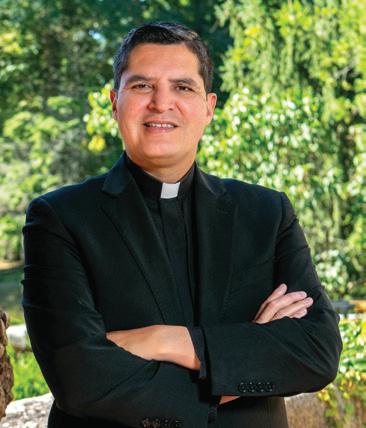
Boston College students or graduates. Career discernment and preparation are built into the Messina curriculum, Fr. Berrelleza said. In addition to the accompanying course, students will work closely with a Boston College Career Center coach throughout the internship process, including preparing them for the internship experience, navigating any challenges, and serving as a resource for on-site internship supervisors.
Messina College is part of Boston College’s $100 million Pine Manor Institute for Student Success initiative to enhance educational opportunity for underrepresented, first-generation students, and marks the first time BC will offer an associate’s degree.
“Internships are where vocation meets opportunity,” says Messina College Dean Erick Berrelleza, S.J. “For many first-gen students, this is the first time they’ll see their potential mirrored in a professional setting.”
photo by lee pellegrini
In today’s economy, Fr. Berrelleza said work experience is crucial to ensure every student has that experience with employers and workforce readiness that their peers will have coming from traditional four-year degree programs.
“Internships are where vocation meets opportunity,” Fr. Berrelleza said. “For many first-gen students, this is the first time they’ll see their potential mirrored in a professional setting. Commonwealth’s inclusive culture allows them to envision a future where they belong.”
The residential college welcomed its first class in 2024, enrolling approximately 200 students at its campus located on the former Pine Manor College, now known as the Brookline Campus of Boston College.
Bernard A. O’Brien ’57, a retired associate professor and longtime chair of the graduate program in counseling psychology at the Lynch School of Education and Human Development, died on August 19. He was 94.
Born in Boston in 1931, Dr. O’Brien was primarily raised by a working mother, grandmother, and sister in a Roxbury apartment; his father, a streetcar operator, was bedridden. He started bagging and delivering groceries in the fourth grade to help feed the family and he earned scholarships to attend Catholic schools, where he played baseball and hockey.
He enlisted in the Army as a medic during the Korean War and credited the GI Bill, along with many hours working as a waiter on catering jobs, for earning enough money to attend Boston College. Dr. O’Brien later received a master’s degree in clinical psychology and a doctorate in counseling psychology from The Catholic University of America in Washington, D.C. He joined the University in what was then the School of Education in 1967.
Dr. O’Brien was named chair of the SOE counseling psychology department in 1983 but was best known for his passion for teaching and helping students. A lifelong champion of the power of a college education to lift individuals such as himself out of challenging economic circumstances, he took great pleasure in awarding scholarships to students admitted to his graduate program.
In the mid-1980s, Dr. O’Brien served on The Goals for the Nineties University Planning Council, which contributed to BC’s self-study for reaccreditation.
“Bernie’s first love was teaching,” said longtime friend, graduate school classmate, and collaborator Richard A. Mackey, a professor emeritus in the BC School of Social Work. “Due to some health issues during the latter part of his career, I filled in for him, teaching his undergraduate class in counseling theories. Despite his challenges, he showed up for the final exam, and as the students completed the test and departed, he spoke to each one individually, clearly demonstrating that he knew them personally. That’s just the way he was.”
Dr. O’Brien and Mackey co-authored two books on enduring relationships: Lasting Marriages: Men and Women (1995) and Gay and Lesbian Couples: Voices from Lasting Relationships (1998); Mackey’s wife Eileen also was a co-author of the latter book.
In Lasting Marriages, the authors presented statistical findings but also included excerpts from interviews with long-time couples on major themes such as initial attraction, conflict, and decision-making to provide a human-centered presentation: One man trying to convey what his marriage of 25 years meant to him talked about “a growing together…like a tree around a boulder underneath the ground. The root eventually goes around it.”
“We were struck by the complemen-

tary relationship of the couples,” said Dr. O’Brien in a 1995 Boston College Chronicle interview. “One of the issues in marriage today is how couples can learn to deal with roles and expectations. The couples we studied have developed the skills and it was not always easy to work out these areas of their life together.”
Similarly, Gay and Lesbian Couples relied more on the qualitative aspects of same-sex marriage discussed by their interviewees: issues such as intimacy, roles, and relational fit. The couples spoke of joys and stresses, including conflicts over money, family and, in particular, public disclosure of the relationships.
“There were certainly some issues more unique to same-sex couples, but they also discussed things that would be familiar to anyone in a long-term relationship,” Dr. O’Brien told Chronicle in 1998. “When you come down to it, relationships are relationships. They take work, they involve compromise and bargaining, and can reveal a lot about who we are.”
Dr. O’Brien retired from the University in 1999.
In 2001, Dr. O’Brien was honored with BC’s Martin Luther King Jr. Community Service Award, presented to individuals who best exemplify the spirit of the slain civil rights leader’s dream of social justice and equality, and his message of public service.
“Bernie was a wonderful and delightful colleague and a beloved mentor to our students,” said Lynch School Professor Emerita Mary Walsh, executive director of City Connects and senior fellow of the Mary E. Walsh Center for Thriving Children. “He both practiced and taught the essence of cura personalis long before it became part of our day-to-day lexicon. He was very committed to articulating the relationship between the Catholic faith and psychology, and to the end of his long life, lived in hope.”
In addition to his wife, Evelyn (Villa), he is survived by his daughters Catherine Strong of Chevy Chase, and Mary O’Brien of Newtown Square, Pa.; grandchildren Ian, Nick, Cayla, Ari and Kate, and a great-grandchild, Lydia; and his brother, Robert. He was predeceased by his sister, Winifred Rome.
Thomas J. Fitzpatrick, S.J., an 88-yearold Jesuit with years of experience teaching theology at Boston College and working in the Middle East, now resides at Campion Center, contemplating and writing poetry. He reflected on his two vocations in an essay for America magazine.
Asst. Prof. Victor Petreca (CSON), a psychiatric mental health nurse practitioner, wrote a piece for TIME magazine on why violent acts are often blamed on mental illness.
USA Today highlighted Drinan Professor of Law Thomas Mitchell’s work on heirs’ property legal reforms.
A ChatGPT for Catholicism? The sources in Magisterium A.I. are 27,000 documents connected to the Catholic Church. Canisius Professor and Vice Provost for Global Engagement James Keenan, S.J., offered his thoughts to The Washington Post.
A Gloucester couple suspects their home was hit by a meteorite. Prof. John Ebel (Earth and Environmental Sciences) of Weston Observatory discussed the possibility in an interview with WBZ/CBS News Boston.
Prof. Heather Cox Richardson (History) was included in TIME magazine’s inaugural list of the 100 most influential digital voices for her newsletter “Letters from an American.”
In her new book, Four Days a Week: The Life-Changing Solution for Reducing Employee Stress, Improving Well-Being, and Working Smarter, Prof. Juliet Schor (Sociology) details findings from an ongoing
global study of the four-day workweek. An essay adapted from the book appeared in The Wall Street Journal; she also discussed the book with MIT’s Sloan Management Review, Boston Public Radio, and Fast Company, among other outlets.
The rise of artificial intelligence raises perplexing questions, including how we relate to the devices we create, wrote Woods College of Advancing Studies Dean David Goodman, executive director of the Center for Psychological Humanities and Ethics, and Matthew Clemente, center director of research and curriculum, in a piece for Psychology Today. The center is a collaboration between Woods College, Lynch School of Education and Human Development, and the Morrissey College of Arts and Sciences.
Prof. Brian Quinn (Law) spoke with The New York Times on Tesla’s reports that it granted shares to Elon Musk worth nearly $30 billion.
WalletHub held Q&As with Lynch School of Education and Human Development faculty recently: Assoc. Prof. Raquel Muñiz and Prof. Emeritus Philip Altbach commented on topics related to community college, while Prof. Jacqueline Lerner discussed disconnected rural youth and related issues.
Prof. Stephen Pope (Theology) wrote an essay on forgiveness and Christian morality for Commonweal.
Brian Bethune, a part-time faculty member in the Economics Department, discussed aspects of the economy and the effect of tariffs in interviews with the Associated Press and Boston Globe.
The following are among the recent positions posted by the Department of Human Resources. For more information on employment opportunities at Boston College, see www.bc.edu/jobs or scan the QR code at right.
Construction Project Manager
Supervisor, Athletic Fields
Assistant Director, Academic Operations
Senior Budget Financial Applications
Analyst
Manager, Research Computing
Classroom Technology Specialist
Public Safety Dispatcher
Waitstaff
Network Systems Engineer
Assistant Director, Graduate Program
Support
Concert Manager
Teacher Assistant

Director, University Health Services
Temporary Office Pool, Academic Advising
Manager, Systems Engineering
Administrative Assistant, Rappaport Center
Physical Security Technician
Enterprise Architect
Administrative and Program Specialist, Educational Leadership and Higher Education
Continued from page 1
for fostering greater employee loyalty and emotional connection to the company, as well as promoting mutual employee-management trust.
“Caregiving isn’t a niche issue—it’s a workforce reality,” said Matz. “Our Concentric case study shows that a simple, flexible five days/40 hours of paid eldercare leave can provide real relief for employees and measurable gains in retention and engagement. We’re eager to share how Critical Mass made it work so other employers can adapt, scale, and support a truly multigenerational workforce.”
The program’s name is meant to convey the philosophy behind the caregiving it supports, she said: a series of concentric circles with the employee at the center. Where a parental leave program represents the first circle of care, a concentric circle is the next, extending outward to address the next stage of life: eldercare.
Among the more significant findings from the case study, according to Matz and Su, was that employees tend to use Concentric time in smaller increments rather than full days: One employee might need two hours to take a parent to a doctor’s appointment, for example, or an afternoon to help their grandparents reorganize their house. But the five days proved useful for one employee who journeyed to Jamaica to care for her grandmother, they noted, and another who traveled to Korea to support her grandfather.
Another employee moved back to his hometown and into his mother’s house while she was in hospice care. He worked remotely for six hours each day, then spent the last two hours of his day having dinner and playing cards with her, until the day she died.
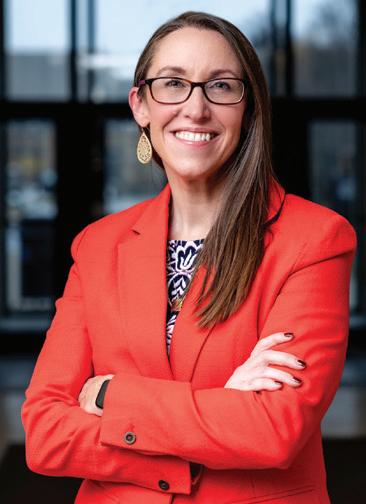
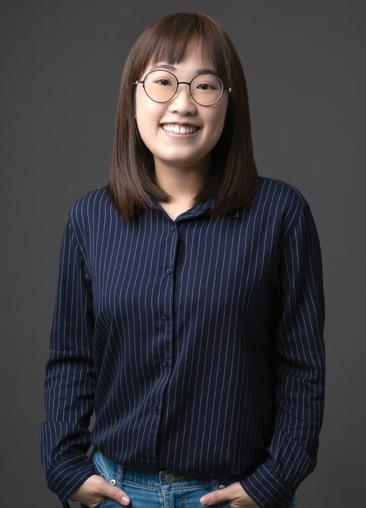
which lent context to their Concentric case study. As they noted, by 2030, nearly 20 percent of the population will be aged 65 or older, a shift mirrored in the labor force where older workers, aged 50 and above, represent a rapidly growing segment. Alongside this aging workforce, they said, “the caregiving crisis is intensifying, with over 53 million Americans providing unpaid care to loved ones.”
Using data from a longitudinal survey taken every two years of more than 20,000 Americans over 50, “The Many Faces of Care” called attention to the experiences of older working caregivers, identifying six distinct caregiving typologies in this group. These included individuals without caregiving responsibilities as well as those engaged in caregiving or financial support for spouses, parents, children, or grandchildren. Each typology highlighted unique sociodemographic characteristics, health outcomes, and well-being profiles.
“This shows how eldercare is a diverse, multifaceted issue that necessitates a great deal of flexibility on the part of the employee and employer,” said Matz. “What stands out about Concentric is that it enabled people in very different situations to be where they needed to be, which is so important to the physical and mental health of the caregiver. It’s vital to understand how and why people use the program, so that the organization can better serve its community.”
Employees also appreciated both the application and request process, Matz and Su noted.
“It’s not always easy to ask for time off
to take care of aging parents or grandparents,” explained Matz. “People often feel discomfort in sharing details about what kind of care they need to provide, when, and for how long. But that didn’t happen with Concentric.”
In fact, she added, Concentric became a “brand name” that employees could use.
“They now call it ‘Concentric time.’ Or, as a manager noted, instead of saying ‘I need time off to take Mom to her doctor,’ people might say, ‘I’m taking Concentric on Thursday.’”
Last year, Matz and Su published a largerscale analysis of caregiving, “The Many Faces of Care”—also published through AARP—
A quartet of Boston College faculty members will discuss how the United States is redefining its economic and foreign policy, and the implications this holds for America’s global relationships and national interests, at the Morrissey College of Arts and Sciences Dean’s Colloquium on September 30 at 4:30 p.m. in Gasson 100.
The panelists are Neenan Millennium Chair in Economics James Anderson, Associate Professor of Economics Farid Farrokhi, Associate Professor of Political Science Lindsey O’Rourke, and Associate Professor of Economics Rosen Valchev.
“America’s New Economic and Foreign Policy” takes place in the wake of considerable upheaval and controversy that has marked President Trump’s term thus far, including his attempts to exert authority over the United States Federal Reserve, his encroachment on private-sector companies, his use of tariffs to reshape post-war U.S. trade policy, and his controversial role in international affairs—notably the UkraineRussian and Middle East crises. These and other developments have had, and continue to have, significant implications for U.S. domestic and foreign affairs.
“I am looking forward to this important discussion on September 30,” said Morrissey College Dean Gregory Kalscheur, S.J. “We are living through tumultuous times with regard to U.S. economic and foreign policy. The Morrissey College is fortunate to include faculty colleagues with the expertise and experience to help us better understand and navigate the current moment. I am grateful for their willingness to share their insights with the larger University community.”
Discussions are under way about expanding Concentric within Critical Mass. Meanwhile, Matz and Greene have submitted a proposal to showcase their work at the South by Southwest (SXSW) conference next March, which would give Concentric more visibility.
“One of our goals is to develop a toolkit for other employers to use in implementing their own eldercare benefit,” said Matz. “Of course, each organization has its unique structure, methodology, and outlook, but we feel Critical Mass’s experience with Concentric is very instructive in addressing the concerns about eldercare.”
To download the case study of Concentric, go to bit.ly/BCSSW-Concentric-case-study
“The Many Faces of Care” is available at https://bit.ly/Matz-Su-Many-Faces-of-Care
co-author—with late Oxford University Professor of Economics J. Peter Neary—of Measuring the Restrictiveness of International Trade Policy.
At a “tumultuous” time for U.S. economic and foreign policy, Morrissey College “is fortunate to include faculty colleagues with the expertise and experience to help us better understand and navigate the current moment,” says MCAS Dean Gregory Kalscheur, S.J.
Anderson, a member of the BC faculty since 1969, has researched and written about international trade, political economy, and economic development. He is known for championing the economic theory of gravity, which provides structural foundations for inferences about forms of trade barriers that are implicit in trade patterns. Winner of the University’s Distinguished Senior Research Award in 1999, Anderson is the
Farrokhi joined the Economics Department in 2024 after having taught at Purdue University; he also has been a visiting faculty member and scholar at Columbia University and Princeton University. His areas of interest include international trade, spatial economics, and environmental economics. He has written or co-authored papers on topics such as trade policy’s mitigation of climate change, wage inequality and the location of cities, and the relationship between trade, technology, and agricultural productivity.
O’Rourke, beginning her 12th year at BC, studies international relations theory, American foreign policy, international security, and military strategy. She is the author of Covert Regime Change: America’s
Secret Cold War, which explores the differences between overt and covert regime change, and argues that conventional focus on overt cases misses the basic causes of regime change; Covert Regime Change won the 2018 International Security Studies Section Best Book Award. She has served as organizer for the Political Science Department’s Foreign Policy Speaker Series.
In addition to teaching at BC, Valchev—who arrived in 2015—is a faculty research fellow at the National Bureau of Economic Research. His research encompasses macroeconomics, international macro and finance, asset pricing, and microfinance. Among his other projects, Valchev co-developed a new theory explaining the sustained dominance of the U.S. dollar as the key international currency, which offers a framework for thinking about what might potentially supplant the dollar, how that would unfold over time, and what would be the repercussions for the U.S. and the global economy.
The colloquium is free and open to the public.
—Sean Smith